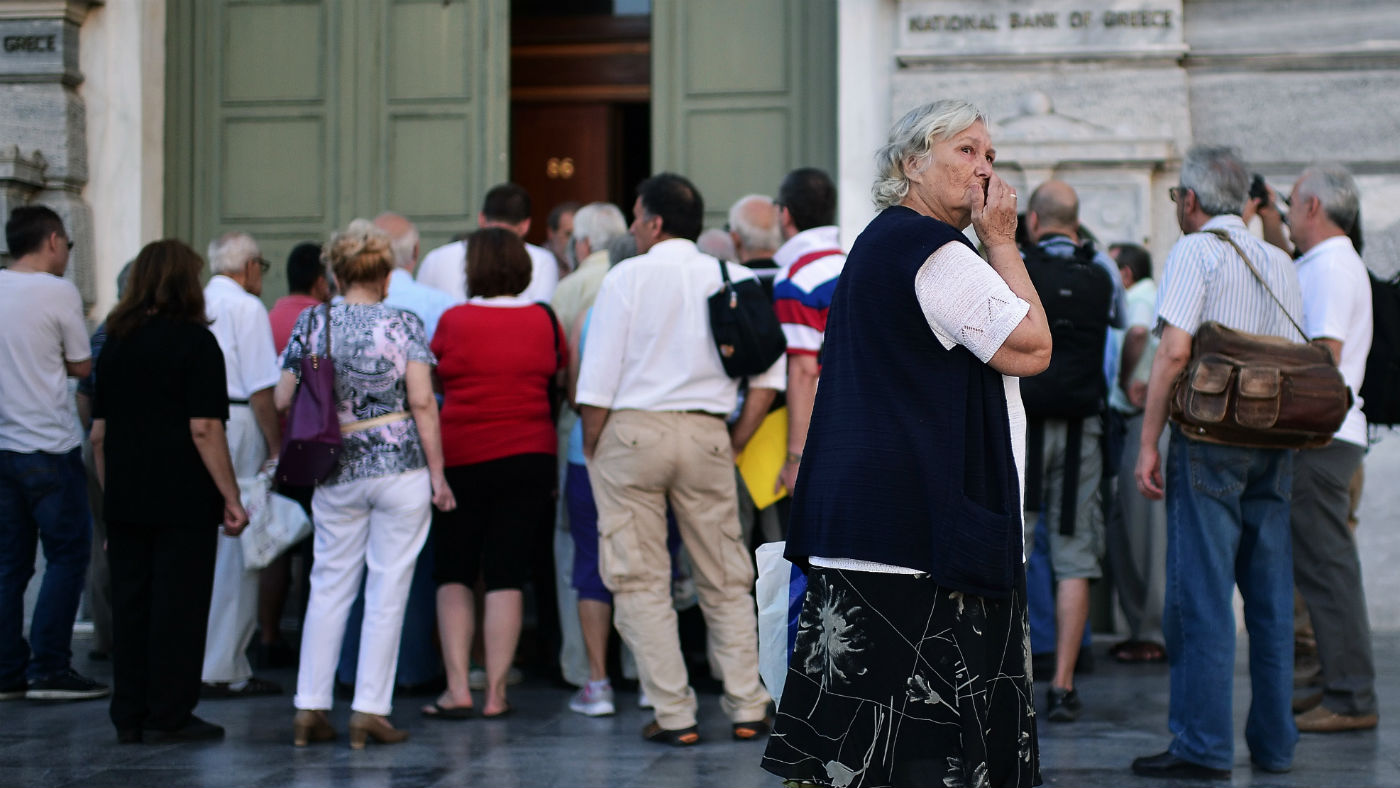Greece to end limits on cash withdrawals
Restrictions on amount of money transferred overseas will also be lifted as capital controls eased

A free daily email with the biggest news stories of the day – and the best features from TheWeek.com
You are now subscribed
Your newsletter sign-up was successful
Greece is to end restrictions on cash withdrawals and the amount of money that can be transferred overseas, as part of wide-ranging measures to ease capital controls imposed at the height of the debt crisis three years ago.
As of 1 October, Greeks outside the country will be able to withdraw up to €5,000 in banks abroad, while the amount of euros or foreign currency allowed to be transferred from Greece to other countries is raised from €3,000 to €10,000.
The new measures also increase the daily limit of money transfers abroad by businesses from €40,000 to €100,000, and allows the transfer abroad of profits and dividends on foreign capital invested in Greece of - up to 100% of the invested amount.
The Week
Escape your echo chamber. Get the facts behind the news, plus analysis from multiple perspectives.

Sign up for The Week's Free Newsletters
From our morning news briefing to a weekly Good News Newsletter, get the best of The Week delivered directly to your inbox.
From our morning news briefing to a weekly Good News Newsletter, get the best of The Week delivered directly to your inbox.
“The decision is one more step on the roadmap towards a gradual lifting of restrictions ... on capital transfers,” the finance ministry said in a statement.
The Syriza-led government of Prime Minister Alexis Tsipras imposed capital controls to stem a flight of cash from Greek banks in July 2015, when, at the height of its debt crisis, it faced bankruptcy and a euro exit.
In a bid to prevent the entire financial system crashing, banks shut for three weeks, after which cash withdrawals were limited to just €60 a day per person.
The intervening three-and-half years saw a long line of cash-raising initiatives, including equipping housewives, students and tourists with cameras and recorders to trap tax dodgers.
A free daily email with the biggest news stories of the day – and the best features from TheWeek.com
At one point police dogs were used to sniff out concealed cash savings. Central bank officials estimated that Greeks had cleared out much of their savings accounts, “with €50bn withdrawn between November 2014 and [July 2016] as fears that the country would be forced out the single European currency soared”, says The Times.
Last month Greece finally emerged from the last of three international bailouts and almost nine years of austerity, although it “remains heavily indebted and under fiscal monitoring by the European Union and International Monetary Fund”, says CNBC.
-
 James Van Der Beek obituary: fresh-faced Dawson’s Creek star
James Van Der Beek obituary: fresh-faced Dawson’s Creek starIn The Spotlight Van Der Beek fronted one of the most successful teen dramas of the 90s – but his Dawson fame proved a double-edged sword
-
 Is Andrew’s arrest the end for the monarchy?
Is Andrew’s arrest the end for the monarchy?Today's Big Question The King has distanced the Royal Family from his disgraced brother but a ‘fit of revolutionary disgust’ could still wipe them out
-
 Quiz of The Week: 14 – 20 February
Quiz of The Week: 14 – 20 FebruaryQuiz Have you been paying attention to The Week’s news?
-
 Epstein files topple law CEO, roil UK government
Epstein files topple law CEO, roil UK governmentSpeed Read Peter Mandelson, Britain’s former ambassador to the US, is caught up in the scandal
-
 Iran and US prepare to meet after skirmishes
Iran and US prepare to meet after skirmishesSpeed Read The incident comes amid heightened tensions in the Middle East
-
 Israel retrieves final hostage’s body from Gaza
Israel retrieves final hostage’s body from GazaSpeed Read The 24-year-old police officer was killed during the initial Hamas attack
-
 China’s Xi targets top general in growing purge
China’s Xi targets top general in growing purgeSpeed Read Zhang Youxia is being investigated over ‘grave violations’ of the law
-
 Panama and Canada are negotiating over a crucial copper mine
Panama and Canada are negotiating over a crucial copper mineIn the Spotlight Panama is set to make a final decision on the mine this summer
-
 Why Greenland’s natural resources are nearly impossible to mine
Why Greenland’s natural resources are nearly impossible to mineThe Explainer The country’s natural landscape makes the task extremely difficult
-
 Iran cuts internet as protests escalate
Iran cuts internet as protests escalateSpeed Reada Government buildings across the country have been set on fire
-
 US nabs ‘shadow’ tanker claimed by Russia
US nabs ‘shadow’ tanker claimed by RussiaSpeed Read The ship was one of two vessels seized by the US military